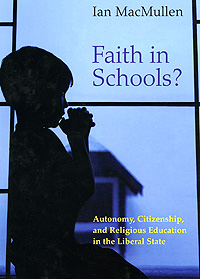Princeton University Press (2007)
Arguing that democratic principles do not support a strict separation of church and state in educational policy, Ian MacMullen, Ph.D., said in his latest book, “Faith in Schools? Autonomy, Citizenship, and Religious Education in the Liberal State,” that government has both the responsibility to pay for religious schools and the right to regulate what’s taught within them.
“There is no justification for policies, such as we find in America, whereby rich parents are virtually unconstrained in choosing a religious school for their child while poor families are stuck with the state-funded secular schools,” said MacMullen, assistant professor of political science in Arts & Sciences.

“The bottom line,” said MacMullen, “is that democracies cannot have it both ways. If faith-based schools meet reasonable public requirements for the education of children, then governments should be willing to support them with tax dollars. If they don’t, they shouldn’t be allowed to operate on anyone’s dime.”
MacMullen noted that many democracies provide substantial funding for faith-based schools. In Great Britain, which still has an established church, the government funds a range of faith schools, including Catholic, Methodist, Jewish, Sikh and, most recently, Muslim.
By contrast, most Americans who send their children to religious schools pay for “the privilege,” all the while contributing their tax dollars for public education.
In one of the most innovative sections of the book, MacMullen drew on developmental psychology to suggest that issues of faith in schools should be approached in different ways as students move from elementary to secondary education.
In elementary education, he argued, schools that reflect the beliefs and values of the child’s family may play an important role in helping young children learn to live consistently within a framework of ethical principles.
However, as these same students mature intellectually and move into secondary schools, the government has a responsibility to ensure that each child receives a robust exposure to the ideas of other religions, to atheism and to nonreligious approaches to ethics.
This experience, he argued, helps children prepare for citizenship in a multi-religious society while furthering their development as independent and critical thinkers.
“Religious schools are central to the upbringing certain parents seek to give their children, but they may also pose a threat both to the civic health of the state and to the embryonic autonomy of children,” he wrote.
“If we are to find a just and principled solution to this controversy, rather than merely deferring in each country to the most powerful political lobby or to the uncertain authority of historical precedent, we shall need reasoned answers to some fundamental questions in political and educational theory,” he noted. —Gerry Everding